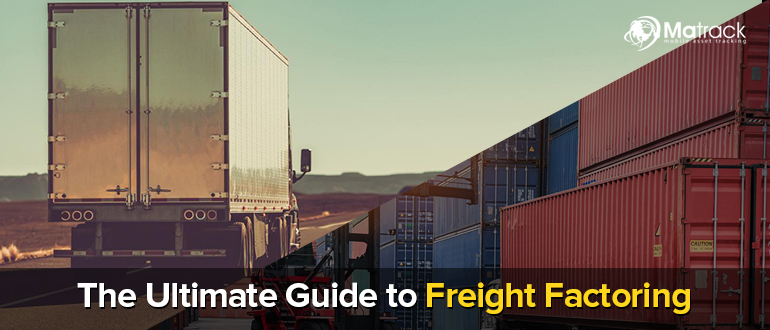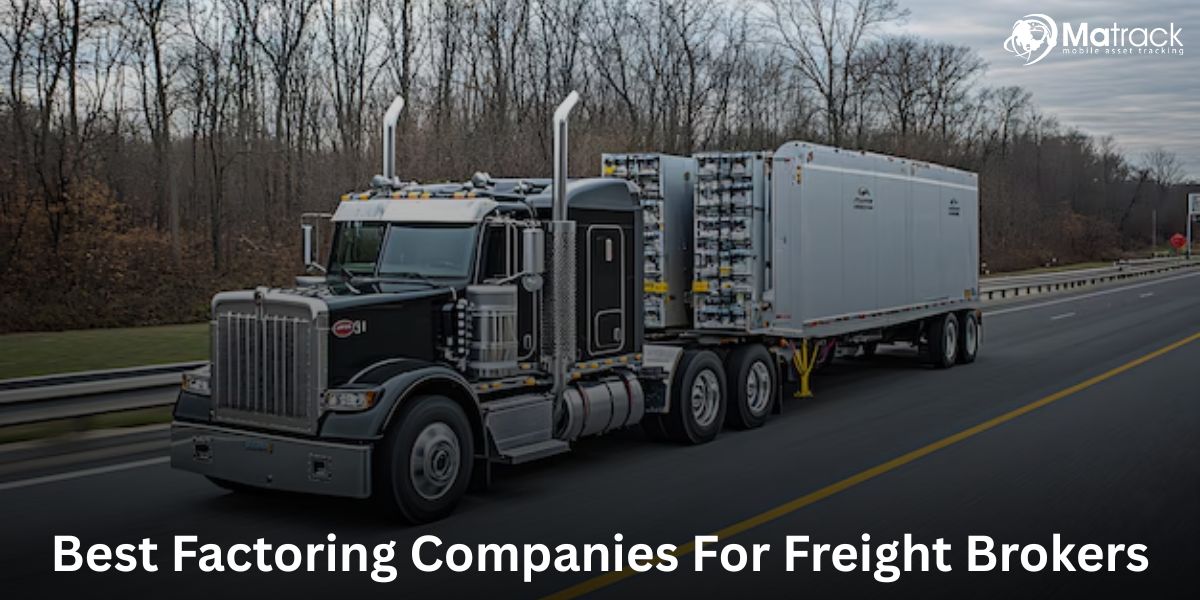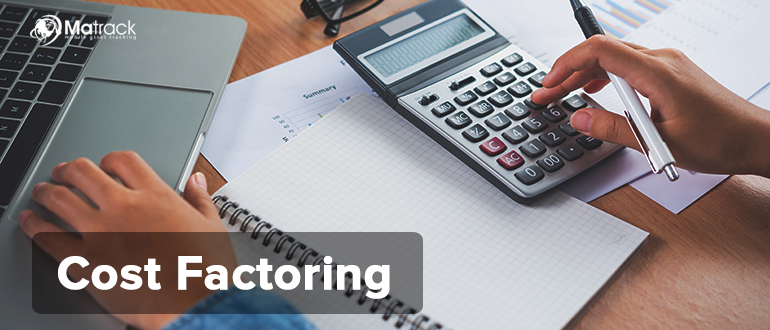Key Takeaways
- Freight factoring gives quick cash by selling invoices.
- It covers expenses to keep operations running smoothly.
- Options include recourse, non-recourse, spot, and contract.
- Benefits include faster cash, easier collections, and risk coverage.
What is Freight Factoring?
Freight factoring, also known as trucking factoring, is a financial service that allows trucking companies to sell their unpaid invoices to a factoring company at a discount.
Instead of waiting 30, 60, or 90 days for customer payments, you receive a significant portion of the invoice amount upfront—typically within 24 to 48 hours.
The factoring company then collects the payment directly from your customer (the shipper or broker) when the invoice is due. For this service, the factoring company charges a small fee, often referred to as a factoring rate or discount rate.
Why is Freight Factoring Necessary?
For any active trucking business, cash flow is what keeps the business running, and freight factoring takes care of that by providing funds for various purposes, including petrol, payroll, and maintenance, among others.
It is a time-saving and efficient method of finance management in the trucking industry. With freight factoring, you convert your delivered freight invoices into cash by shifting peddling in the accounts receivables to specialist factoring companies. This would give a consistent stream of cash inflow and ensure that your trucks are always on the go.
Also, there are many other advantages associated with freight factoring:
- Drivers can get paid as quickly as 24 hours after submitting their invoices.
- Since the cash flow is consistent and continuous, there is no need to put any of your operations and trucking loads on hold for any reason.
- Eliminate the need to account for cash and accounts by getting a third party out to do it for you, relieving you of the time and resources spent.
- Prevent paying late on any debts that would stain the reputation of your business.
In addition, freight factoring will allow a steady cash flow to be maintained on the condition that the business is not overly reliant on it and provides for near-instant payments.
How Does Freight Factoring Work?
Freight factoring simplifies a crucial aspect: expediting payment for completed work. Here’s how it works:
- Your truck driver completes a standard load delivery.
- You send essential documents, such as the rate confirmation and bill of lading (BOL)/proof of delivery, to your chosen factoring company.
- The factoring company confirms the delivery with the brokerage or shipper.
- Following verification, the factoring company deposits the payment into your account using your preferred funding method, which can result in an overnight or immediate transfer.
- Subsequently, the factoring company takes charge of collecting payments for the entire invoice duration.
- Once the customer settles their dues, the factoring company deducts their fee and closes the invoice.
Types of Freight Factoring
Recourse factoring
Recourse factoring is a way of financing invoices where freight factoring processes the invoice for instant cash. Now, it is the responsibility of the freight factoring company to collect money from the business’s clients.
In any case, where the client fails to complete the payment, the freight factoring company asks the trucking business to repay the amount.
Non-recourse factoring
Non-recourse factoring is a type of invoice financing where the truck company sells its invoice to the freight company, and the freight company is responsible for immediate payment and assumes the risk associated with it.
Spot Factoring
Spot factoring includes financing a single invoice rather than taking into account various invoices. Trucking companies that need to process a single sizable one-time invoice can use it.
Spot factoring is a particular type of factoring that trucking companies frequently use to cover a specific expense.
Contract factoring
Contract factoring is used most frequently by large trucking companies, who work with a freight company to handle all of their invoice finances for a set amount of time.
However, you should be aware that freight factoring is a complicated process that involves extensive terms and agreements that the trucking company must fully comprehend before entering into any contract with a freight company.
Benefits of Freight Factoring for Truckers
Improved Cash Flow
Improved cash flow gives truckers immediate access to working capital, enabling them to cover operating costs like fuel, repairs, and payroll without waiting for customer payments.
No Debt Incurred
No debt is incurred because freight factoring involves selling an invoice for immediate cash rather than taking out a loan.
Simplified Financial Management
Simplified financial management helps factoring companies frequently take care of collections, saving drivers time and effort when it comes to following up on payments.
Flexibility
Flexibility is offered by many factoring companies, allowing truckers to factor in only the invoices they choose without committing to long-term contracts.
Credit Protection
Credit protection is provided in non-recourse factoring, shielding truckers from losses if a customer becomes insolvent.
What Does Freight Factoring Cost?
The cost of freight factoring depends on several factors, including the type of factoring, the creditworthiness of your customers, and the volume of invoices you factor. Here are some key cost components:
- Factoring Fee: Typically ranges from 1-5% of the invoice value.
- Advance Rate: The percentage of the invoice value advanced to you upfront (usually 80-95%).
- Additional Fees: Some companies charge extra for services like same-day funding or processing small invoices.
Know More About: What is the Cost of Factoring?
Frequently Asked Questions
What should I look for in a freight factoring company?
Key factors include reputation, experience in the trucking industry, transparent fees, flexible contract terms, competitive advance rates, and excellent customer service. Know More.
Do I have to factor all my invoices?
Not always. Some companies offer flexibility, allowing you to choose which invoices to factor, while others may require factoring all invoices.
Are there hidden fees in freight factoring?
Some companies charge additional fees like monthly minimums, small invoice fees, or contract termination penalties. Review contracts carefully for transparency.
How do I know if freight factoring is right for my business?
If delayed payments disrupt your cash flow or you need immediate funds for operating expenses, factoring is likely a good fit.
Can freight factoring help small or startup trucking businesses?
Yes, it is especially beneficial for startups and small trucking businesses with limited access to traditional loans or credit.
Does freight factoring impact my credit score?
No, freight factoring does not affect your credit since it is not a loan. The factoring company evaluates your customers’ creditworthiness.
Is freight factoring a loan?
No, it is not a loan. Factoring involves selling unpaid invoices for immediate cash and does not create debt.
Do only struggling trucking businesses use factoring?
No, many profitable trucking companies use factoring as a strategic tool to stabilize cash flow and fund growth.
Conclusion
Freight factoring is a practical solution for trucking companies to maintain consistent cash flow. It converts unpaid invoices into immediate working capital, ensuring smooth operations without delays.
By offering options like recourse, non-recourse, spot, and contract factoring, it caters to various business needs. These options provide flexibility, credit protection, and simplified financial management.
While factoring involves fees, the benefits often outweigh the costs. Consistent cash flow and debt-free financing enable truckers to focus on growing their businesses.
With the right factoring partner, trucking companies can keep their operations running smoothly. It is a strategic tool to drive growth and protect business reputations.



